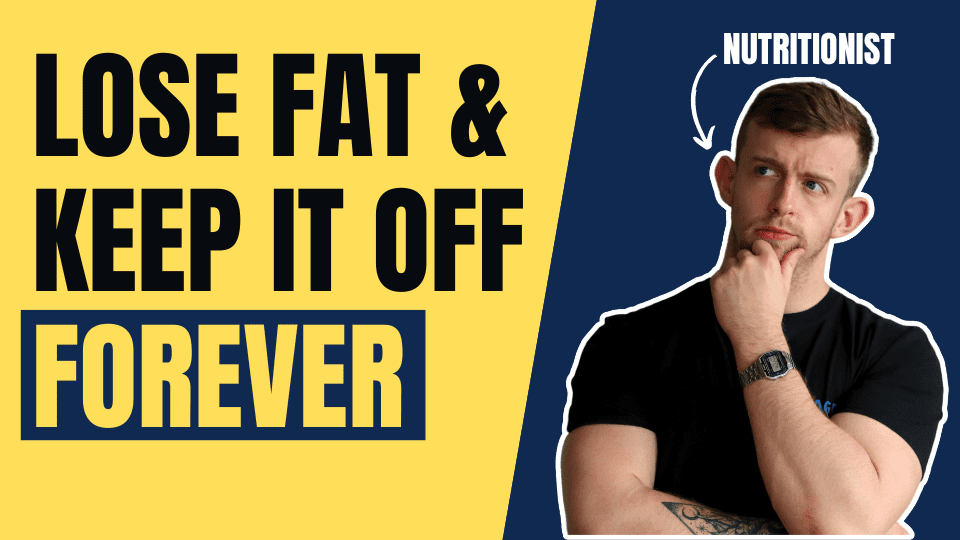Learning how to lose fat and keep it off forever is the end goal for most people looking to lose fat. I can’t think of very many people who want to put all the effort into losing fat, to then have to go through that process over and over again. Yet, this is exactly what happens to most people. They spend a lot of time and effort losing fat, to then just regain it all, and have to start the process again. We see this all the time in our coaching, and it is one of the things we are known for solving. So, this is how we teach our coaching clients to lose fat and keep it off forever!
How To Lose Fat And Keep It Off Forever
Hey guys, it’s coach and nutritionist Dean McAloon here!
Today, we’re going to talk a little bit about why fat loss diets often don’t work and what you can do to create sustainable fat loss for the rest of your life. Now, there are many factors why it’s very difficult for people to lose weight and keep it off, but a lot of it does come down to the multi-billion dollar industry of diet and supplements that lead people down a path of fad or crash diets, and it never actually creates any sustainable habits for them to go off and live throughout the rest of their life.
A lot of these fad diets and supplements are sold under the pretence that you’re going to be able to fix decades of overconsumption in a matter of a few weeks by just taking this magic pill or potion. The unfortunate reality of this is it is a fairy tale. But what I’m going to do today is explain exactly how you can lose fat and keep it off in a sustainable fashion.
I’ve worked with a lot of fat loss plans over the years, and one of the biggest things that I see in terms of common themes is people using very extreme approaches. And this is very difficult to adhere to beyond a couple of weeks. Crash diets and super low-calorie diets are going to result in very high levels of hunger, very low energy levels, and it’s going to be a very miserable experience overall, especially when it’s not planned out very well.
So, what we do obviously need to do is restrict calories to make fat loss happen. It doesn’t need to be a super extreme approach, and this is especially true if you’ve never been able to do it sustainably and successfully in the past. If you were to go into a consistent three to five-hundred-calorie deficit every day for three months, you’d lose between 7 and 12 pounds of fat, which is fairly substantial. This is a really nice level of progress, and it means that you won’t be dealing with much of the day-induced negatives like increased hunger and cravings and low energy levels.
So, a more modest calorie deficit is the way to go here, and if you need more specific help with setting up your calories for fat loss, you can read this article on setting up the diet and of course, you can always reach out for coaching. Once you have a reasonable number of calories set, we now must talk about food selection. Another massive problem of common dieting strategies is that what people are eating is not that filling. People either try to fit too much junk food or low-satiety foods into their diet, and it just leaves them very hungry and experiencing a lot of cravings, especially towards the evening time.
We want about 80 to 90% of our diet to be made up of lean proteins like chicken breast, turkey, tuna, low-fat beef, lots of fruits and vegetables, and of course, filling carbohydrates like potatoes, oats, beans, and lentils. If the bulk of your diet is whole foods like the ones I just described, it’s going to be way more filling and satisfying. And then what you can do is you can fill the remaining 10 to 20% of your diet with whatever kind of food you like. This means that your calorie intake is going to be much easier to stick to because your hunger is well-managed. You’re going to be healthy because you’re getting a broad range of nutrients in your diet, but you’re also leaving a little bit of wiggle room for those treat foods, those meals out, or that little bit of alcohol that you want to enjoy at the weekends.
Now, another big aspect of why fat loss diets are very difficult for people to succeed with is because they don’t have any long-term planning in place. When I’m working with people from a fat loss or general body composition improvement perspective, I’ll always make sure to sit down with them and map out a timeline in terms of when we’re going to start the fat loss phase, when we would generally like to end the fat loss phase, how long we’re going to spend in the maintenance phase, and so on. Most people will just jump into a fat-loss phase and see what happens. They don’t have any endpoints in place, and it’s a bit chaotic. If you have a timeline on where your fat loss phase is going to end and when you’re going to move into a maintenance phase where you try to conserve and maintain the results you achieved in your fat loss phase, you’re significantly more likely to succeed.
Don’t just think about what’s going to happen over the next six days or six weeks. You want to have a timeline for what’s going to happen over the next six months and beyond. If you’re actually serious about making long-term changes to your weight and body composition, this is how you want to be thinking. From a more long-term perspective, in my own practice, a big thing that I’ll work with clients on is their mindset with regards to setbacks and randomness in their schedule.
Life is inherently chaotic, and you can’t expect yourself to adhere perfectly to a fat-loss diet, especially over extended periods of time. So, an acceptance of that fact is massively important and also being aware that some days are just simply not going to go your way. But also understanding that a single day or even a few days of not hitting your calories perfectly is not going to decimate your results and it’s not going to send you back to the starting line.
So, we’ve covered calorie intake, food selection, having a general timeline of your goals, and your mindset. And another big aspect of this is making sure that you’re measuring progress correctly. If you’re not measuring changes properly, you’re going to have a hard time knowing whether or not you’re moving in the right direction. To create an accurate representation of your progress, you want to be trained to weigh yourself three to seven times per week, ideally daily and in the morning, using tape measurements, specifically the waist and the hips. And also taking some progress photos as well.
The reason that I like to do this with clients is that by having specific guidelines around how you’re measuring and using multiple different forms of measurements, it improves the view that you have of your progress. Rather than just relying on one thing, such as weekly weigh-ins, which can be very inaccurate at times. One of the most common issues that you’ll see with the likes of slimming clubs is the lack of precision, and this obviously doesn’t give you a good idea of whether you’re actually losing body fat or not.
Finally, we want to have realistic expectations of what’s possible. You may have a desire to look like Chris Hemsworth in Thor, but if I’m being completely honest with you, there is basically a zero per cent chance of this happening. Because not even Chris Hemsworth looks the way he does in the Marvel movies. It’s much healthier in the long term to use yourself as a barometer for success rather than trying to conform to some ideal of somebody else that has different genetics, lifestyle, and circumstances to you.
So, in conclusion, if you want to be successful with losing fat and keeping it off forever, you do have to look at this from a longer-term perspective, and honestly, you want to see yourself being able to do this for the rest of your life. If you can’t see yourself implementing a particular diet for the rest of your life and you see it as pretty unsustainable, then there’s not much point doing it for two to four to six weeks. If you need help with your diet specifically, I do coach people to better nutrition and I am confident I can help you accomplish the goal of losing fat and keeping it off forever. So if you are interested, please don’t hesitate to reach out! If you feel like you don’t need coaching, but still want to learn more about setting up good nutrition patterns, we do have lots of content on the website and on YouTube that will help you. If you are interested in becoming a nutrition coach, we do also have a Nutrition Coaching Certification program that may be of interest to you. If you liked this, you may also like this article on fat loss supplements that actually work.
| Key Takeaways |
|---|
|
|
|
|
|
|
|
|

Dean McAloon
Hey I’m Dean, performance nutritionist and coach at Triage. I have a post graduate diploma in performance nutrition, and have been coaching people to transform their health, performance and body composition since 2016.
I love lifting, BJJ, reading, music, food and spending time with my family and friends.


